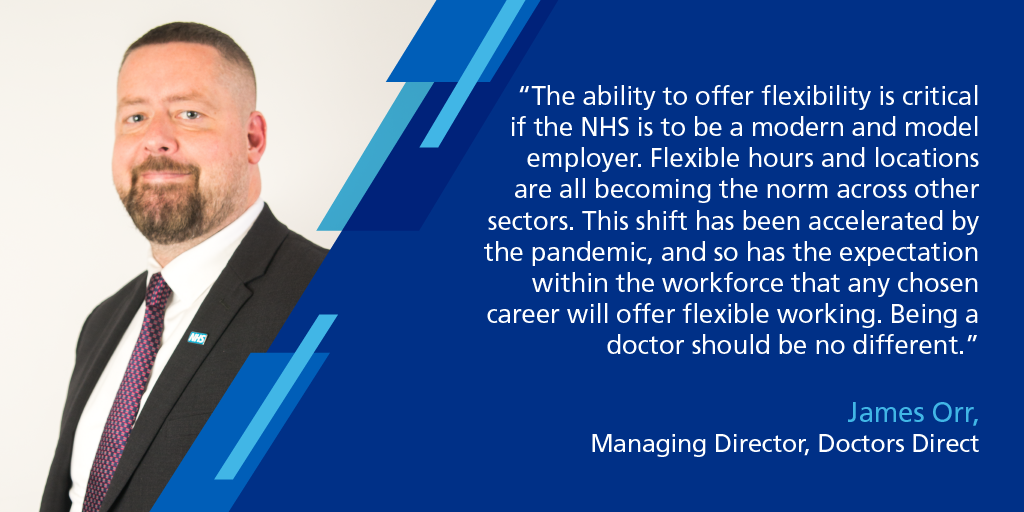Offering flexibility for our doctors

Author: James Orr, Managing Director, Doctors Direct
The NHS People Plan 2020 encourages employers to deliver flexibility by default – to be open to all roles being flexible, and to make this a reality for their staff. The Plan recognises that every leader and manager in the NHS must take the time to understand what each person needs, so that they can incorporate work more easily into the rest of their lives. This, of course, includes doctors.
However, with the respect and recognition that comes with being a doctor, there has historically been a sense that it is a vocation. And with that, an expectation that doctors should accept a lack of work-life balance and the long hours that come with the job. Many people enjoy popular television dramas such as Casualty, ER and Grey’s Anatomy but they certainly don’t do anything to help this perception!
While ‘doctoring’ might be a vocation for many, doctors deserve the same balance and quality of life as everyone else.
Flexible NHS careers
The ability to offer flexibility is critical if the NHS is to be a modern and model employer. Flexible hours and locations are all becoming the norm across other sectors. This shift has been accelerated by the pandemic, and so has the expectation within the workforce that any chosen career will offer flexible working. Being a doctor should be no different.
At Doctors Direct, we understand that flexibility means different things to different people – around when, how and where doctors work. The NHS is one of the nation’s largest employers and we are working with all our partner Trusts to identify new ways of working to attract and retain the crucial doctors that the health service needs.
Understanding doctor’s needs
Of course, doctors do what they do because they want to help people. But it’s more than okay to need and want other things from a career. To help support this further, we are conducting research to better understand the groups and individual needs within our flexible doctor workforce so that our service offering is relevant and accurate.
What we do know is that flexibility will remain a key part of our offering, including access to opportunities through a whole career. From our extensive experience working with candidates, we know this can be at one of several stages:
- Studying – access to ad hoc shifts that fit around studies can help expand experience and knowledge in an area of expertise.
- Family commitments – the NHS employs a higher than average number of people with caring responsibilities. Whether doctors are young parents, caring for older family members, or both, we know that they need shifts in a local Trust within hours that suit their family.
- Retiring – choosing to work less hours, potentially with less management responsibility, but still wanting to ‘do your bit’ is a fantastic and flexible way to continue contributing to the NHS.
Meeting individual needs
As well as research to find out more about what doctors want, we are also working on targeted projects to address a wide variety of these needs. For example, encouraging clinicians to return to practice has been a key part of the recruitment drive during the pandemic. A recent survey of returners revealed that around 50% were ‘interested in continuing to work in the health and social care system in the medium to long term in some capacity’.[i]
We can now build on this interest to support the pandemic response and recovery, to both attract more doctors and engage those who have expressed an interest in staying. At Doctors Direct, we aim to offer shifts that allow returners to build experience, as well as the relevant training needed to support a return to practice. We are also working with our colleagues across the NHS to streamline the revalidation process, and offer a simple route from temporary registration to full registration that builds and improves on the existing return to practice scheme.
For early career doctors, the NHS People Plan outlines how flexibility can be achieved. With training moving to be less than full-time, out of programme pauses, and opportunities to develop a portfolio career. Doctors Direct offer additional shifts to gain experience and supplement income around training, including, shifts to get doctors back up to speed after a pause, or shifts that make up a part of an ongoing career.
Flexibility for the future
Whether working across Bank, fixed term or permanent roles, we know that being a doctor can be very different across a variety of specialities within the NHS. More work is still needed to find out what flexibility means for all doctors, and to deliver on priorities outlined in our research. Doing so will be an important part of building a flexible, modern NHS that is able to respond to and recover from the challenges of COVID-19, and to maintain a health service that balances the needs of patients with the equally important needs of doctors.
[i] We Are The NHS: People Plan 2020/21 – action for us all